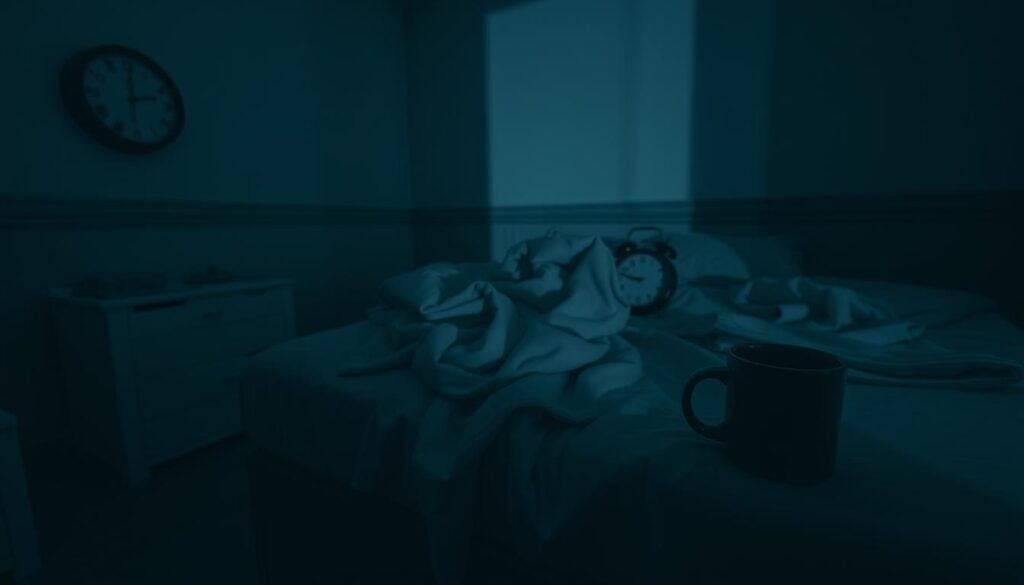It’s shocking to find out that more than 90% of people with depression fight a tough battle against fatigue. This type of fatigue is known as depression fatigue. It significantly affects those with Major Depressive Disorder (MDD). What’s even more concerning is that up to one-third of individuals who get better from MDD still feel very tired. This article looks closer at how depression and fatigue are connected. We explore the signs, symptoms, causes, and treatment options for this exhausting problem.
Key Takeaways
- Depression fatigue affects over 90% of individuals with depression.
- Many patients continue to experience fatigue even after treatment.
- Regular exercise can significantly alleviate symptoms of depression fatigue.
- Psychotherapy is an effective approach for managing fatigue related to depression.
- Healthy sleep habits and balanced diets aid in reducing chronic tiredness.
Understanding Depression
It’s critical to grasp the depth of clinical depression and its effect on people. Known as major depressive disorder (MDD), it deeply influences thoughts, feelings, and actions. Sufferers often feel an ongoing sadness, lose interest in once-loved activities, and battle with fatigue.
What is Clinical Depression?
Clinical depression is a major mood disorder with emotional and physical challenges. Those affected may feel hopeless and extremely tired, affecting their day-to-day life. Studies show that imbalances in neurotransmitters can cause this fatigue. Stress and a poor diet can make things worse. To really understand clinical depression, we need to consider how mental and physical health interact.
Common Misconceptions About Depression
There are many wrong ideas about depression. Some people wrongly see it as just weakness or a short period of sadness. But, depression is a real medical issue that needs complete treatment. Sadly, about 80% of those with clinical depression don’t get the help they need. By learning and spreading the truth, we can help those struggling with depression.
Want to know more about spotting depression and fatigue? Check out expert information here.
The Connection Between Depression and Fatigue
Depression greatly affects your energy levels. It does this by changing neurotransmitters that control alertness and want to do things. Knowing how depression leads to fatigue is key. This knowledge helps those who are going through it understand the link between mental health and feeling drained.
Why Does Depression Cause Fatigue?
Depression and fatigue are closely linked. Over 90% of people with depression feel very tired. Sleep issues like insomnia and sleeping too much are common. About 80% face these sleep problems.
Depression can cause changes in what you want to eat, making you choose foods that are high in fat and sugar. These foods can make you feel even more tired. Also, if you don’t feel like moving or exercising, your energy levels can drop even further. It becomes a hard cycle to break.
The Psychological and Physiological Effects
From the mind’s view, feeling sad and empty can make you feel more tired. It can make your brain feel foggy, making it hard to think or make decisions. On the body’s side, not sleeping well is a big reason for feeling drained. Eating foods that cause inflammation can also make depression and tiredness worse.
Doing things like getting enough sleep, eating well, and moving a bit can help fight the tiredness that comes with depression.
| Area | Impact of Depression |
|---|---|
| Energy Levels | Over 90% report fatigue |
| Sleep Patterns | 80% suffer from insomnia or hypersomnia |
| Nutritional Choices | Preference for unhealthy foods increases fatigue |
| Physical Activity | Lack of motivation lowers energy |
| Brain Function | Brain fog affects cognitive ability |
Signs and Symptoms of Depression Fatigue
Depression fatigue is more than just feeling tired. It affects your emotions, thoughts, and body. Knowing the symptoms helps us deal with it better. Each type of symptom – emotional, cognitive, and physical – shows up in its own way.
Emotional Symptoms
Depression makes it hard to feel motivated. People may feel empty, hopeless, or quickly get upset. These feelings can hurt friendships and how well someone does their job. This often makes the person feel even more alone and sad.
Cognitive Symptoms
Depression can also make it hard to think clearly. You might find it difficult to focus or remember things. These challenges make everyday tasks feel overwhelming. They add to the feeling of being too tired to handle even small duties.
Physical Symptoms
Many people with depression feel physically exhausted. They might have no energy or feel like their body is very heavy. Addressing these physical signs is key. They affect not just health, but also how actively someone participates in their recovery and daily life.
| Symptom Category | Common Symptoms | Impact on Daily Life |
|---|---|---|
| Emotional | Decreased motivation, irritability, feelings of emptiness | Hindered relationships and work performance |
| Cognitive | Difficulty concentrating, slow information processing, memory issues | Challenges in daily tasks and decision-making |
| Physical | Reduced endurance, low energy levels, feelings of heaviness | Difficulty engaging in everyday activities |
Recognizing Mental Exhaustion
Mental exhaustion is when you feel very tired in your mind and emotions. This state makes it hard to deal with daily tasks. Knowing about this condition is important for those dealing with big demands every day. This often leads to burnout. Spotting the signs early helps in finding ways to deal with it.
Defining Mental Exhaustion
Mental exhaustion happens from too much thinking or not enough rest. It can make you feel irritable, anxious, and hard to focus. Studies show people with tough mental jobs often can’t sleep well. This tiredness can harm your mind and body. It can even cause long-term stress problems.
Impact on Daily Life and Responsibilities
Being mentally exhausted can mess up how you handle daily tasks. It can make you less productive. For example:
- Impaired performance in high-stakes jobs: You might find simple tasks hard. Things like using machines or driving get tougher because you can’t focus well.
- Unhealthy eating habits: Feeling mentally tired can make you snack more. Or you might want bad foods, changing what you eat.
- Physical activity limitations: You may not feel like exercising much. Even how you see effort during activities can change.
- Increased anxiety and panic: Feeling tired all the time can make anxiety worse. This can make you feel more stressed and alone.
To fight mental exhaustion, take regular breaks at work. Methods like the Pomodoro Technique are useful. This method mixes work with short breaks. For example, moving a little during breaks can help. This can make you feel more energized. It helps in handling your work better.
| Aspect | Effect of Mental Exhaustion |
|---|---|
| Work Performance | Reduced focus, increased mistakes |
| Emotional State | Increased irritability, heightened anxiety |
| Physical Health | Headaches, sleep disturbances, fatigue |
| Social Interactions | Withdrawal, decreased motivation |
Causes of Depression Fatigue
Several intertwined elements contribute to depression fatigue. These include biological factors, environmental factors, and lifestyle choices. Each has a unique impact, especially when combined with depressive symptoms.
Biological Factors
Genetics and brain chemistry play key roles in depression fatigue. Imbalances involving neurotransmitters like serotonin can cause exhaustion. Health issues like thyroid problems, chronic fatigue syndrome, and autoimmune disorders also lead to fatigue, mimicking depression.
Environmental Factors
Prolonged stress from work, personal relationships, or big life changes can wear down our emotional resilience. Such stress can worsen depression and increase fatigue. Trauma or changes add to this tension, draining our energy further.
Lifestyle Choices and Their Impact
Lifestyle choices greatly affect our energy and mental wellness. Poor nutrition, not enough exercise, and substance abuse all lead to chronic fatigue. But, healthy habits can improve this. Regular exercise, eating well, and avoiding too much alcohol or drugs help improve mental health. If fatigue disrupts daily life, getting professional help is a good step. For more details, visit this resource.
Assessing Symptoms of Depression Fatigue

It’s crucial to accurately assess depression fatigue to treat it effectively. Clinicians use various methods to measure symptoms precisely. This understanding helps professionals meet the unique needs of those with depression fatigue.
Clinical Assessment Techniques
Doctors often start with detailed patient interviews and standardized tests. The Patient Health Questionnaire (PHQ-9) is used to diagnose and keep track of depression’s severity. The Mood Disorder Questionnaire (MDQ) helps rule out bipolar disorder. Tools like Beck’s Depression Inventory and the Hamilton Rating Scale for Anxiety are also key. They help get a detailed view of someone’s mental health.
Self-Reporting Tools and Scales
Self-reporting scales are vital in measuring symptoms and their impact on life. Tools such as the Fatigue Questionnaire and the Brief Fatigue Inventory let patients share their feelings. This approach leads to more personal clinical evaluations. These tools’ data show significant changes in fatigue, emphasizing the need to monitor these changes. The link between scores from the Fatigue Assessment Scale for Depression (FAsD) and the Brief Fatigue Inventory confirms the strong connection between fatigue and depression.
Treatment Options for Depression Fatigue
Treating depression fatigue needs several steps. This includes using medications, therapy, and other methods. Together, these form a custom treatment plan.
Medications: Antidepressants and Alternatives
Doctors often prescribe antidepressants like SSRIs and SNRIs. But, they might not work for everyone. Some folks feel even more tired. For them, bupropion could be a better choice, as it’s known for causing less fatigue.
Psychotherapy: Cognitive Behavioral Therapy and More
Cognitive behavioral therapy (CBT) is a powerful way to tackle depression fatigue. It helps find and change negative thoughts and actions that add to tiredness. Other therapies, like interpersonal or mindfulness-based, also help by improving coping skills and emotional insight.
Alternative Therapies and Supplements
There are also non-standard options to fight depression fatigue. Exercise is a key example. Just 20 minutes of light to moderate exercise can boost your mood. Eating foods high in antioxidants, like fruits and nuts, helps too. These can improve your mood and energy.
| Treatment Option | Type | Benefits | Considerations |
|---|---|---|---|
| Antidepressants (SSRIs, SNRIs) | Medication | Reduces depressive symptoms | May increase fatigue in some individuals |
| Bupropion | Medication | Lower residual fatigue rates | Individual response may vary |
| Cognitive Behavioral Therapy | Psychotherapy | Improves coping strategies, addresses negative thought patterns | Requires commitment to sessions and exercises |
| Exercise | Alternative Therapy | Alleviates fatigue, boosts mood | Should be tailored to individual fitness levels |
| Antioxidant-rich diet | Alternative Therapy | Regulates mood, enhances energy levels | Requires consistent dietary changes |
Managing Depression Fatigue Daily

Improving your energy and mood when you have depression means adopting simple but effective habits. Focus on exercises, healthy meals, and getting enough sleep. These steps help you handle depression better.
Importance of Exercise
Exercising regularly is key to fighting depression fatigue. Aiming for 150 minutes of activities like brisk walking every week boosts endorphins. This improvement in mood is vital. Plus, exercising helps you sleep better and reduces tiredness related to depression.
Healthy Eating for Better Energy Levels
A good diet keeps your energy up and supports well-being. Start by eating soon after you wake up. Then, keep eating small meals every 4-5 hours. Focus on foods rich in omega-3s, veggies, and avoid too much sugar.
Choosing to eat healthy instead of following strict diets is more beneficial. Also, cutting down on alcohol and caffeine helps stabilize your mood.
Establishing Healthy Sleep Habits
Good sleep habits are crucial in managing fatigue. Stick to a regular sleep schedule. Avoid screens before sleep and make sure your bedroom is cozy. It helps improve your sleep directly affecting your mood and energy levels.
For additional tips on dealing with depression, professional help can make a difference. Learn more here.
Overcoming Lack of Motivation and Apathy
Dealing with lack of motivation and apathy can make life better for those with depression fatigue. It’s vital to find coping methods to take back control and improve well-being.
Coping Strategies for Daily Empowerment
Using specific coping strategies can really help increase motivation. Some good techniques include:
- Setting small, achievable goals to foster a sense of accomplishment.
- Breaking tasks into manageable steps, making them feel less overwhelming.
- Utilizing positive reinforcement to reward oneself for completing tasks.
- Establishing a routine that incorporates enjoyable activities, promoting engagement and interest.
- Practicing mindfulness techniques to enhance focus and reduce anxiety.
These approaches help people fight apathy. They turn everyday life into something more positive and rewarding.
Seeking Professional Help
Some might need professional help to overcome their lack of motivation. Mental health experts offer specific strategies and help. They could suggest:
- Therapeutic approaches such as Cognitive Behavioral Therapy (CBT) to restructure negative thought patterns.
- Medication options like antidepressants or stimulants to improve emotional regulation and energy levels.
- Support groups to foster connections with others facing similar struggles, reducing feelings of isolation.
Getting professional support provides a strong base. It helps individuals tackle their issues with more confidence.
Long-term Strategies to Combat Chronic Tiredness

To handle chronic tiredness well, you need to take care of your emotional and physical sides. Having good friends and learning to be mindful really helps fight tiredness. These steps make you stronger in dealing with fatigue.
Building a Support System
Having friends, family, or groups to support you is really helpful when you’re always tired. They give you emotional support, help you stay on track, and make you feel less alone. Being with people who get what you’re going through can share tips and ways to cope.
Meditation and Mindfulness Practices
Meditation and being mindful can greatly reduce chronic tiredness. They clear your mind and focus your thoughts, helping fight off fatigue. Practicing mindfulness regularly helps manage emotions, reducing stress and boosting your energy. These methods help you take charge of your tiredness and build your strength.
Activities like deep breathing, yoga, and tai chi are also beneficial. Looking into chronic fatigue syndromes can give more ways to help yourself. Knowing that chronic tiredness affects both your mind and lifestyle choices helps in finding solutions for better health.
When to Seek Professional Help
Knowing when to get professional help is key to dealing with depression well. People with ongoing emotional problems should watch out for major signs. These signs mean they might need urgent help. Spotting these signs early can really help treatment work better. So, it’s crucial to know when to get help from experts in mental health.
Recognizing Serious Symptoms
Depression’s serious symptoms can differ a lot. They often include:
- Persistent sad, anxious, or empty mood
- Hopelessness or feelings of guilt
- Loss of interest in activities once enjoyed
- Fatigue or decreased energy
- Difficulty concentrating or making decisions
- Thoughts of suicide or self-harm
If these symptoms last over two weeks and mess with everyday life, getting help is important. Those facing such severe symptoms should quickly talk to a mental health expert. This is for a proper check-up and support.
The Role of Mental Health Professionals
Mental health pros are key in fighting depression and tiredness. They’re trained to check, identify, and plan personalized treatment. This could mean therapy, medicine, or both. Working with a skilled expert can offer effective help. It gives people ways to handle their symptoms and make life better.
Conclusion
Depression fatigue greatly impacts those with major depressive disorder, affecting up to 90% of people. This condition, often overlooked, hinders daily life. Recognizing signs and symptoms, along with treatment, is key to recovery.
This mood disorder can hit anyone, regardless of age or background. With the right help—from medication, therapy, to lifestyle changes—people can start feeling better. Making healthy choices like exercising, eating well, and good sleep habits boosts energy.
Moreover, it’s important for those feeling constantly tired to seek professional advice. This step is crucial for bettering their life quality.
Depression causes disability globally, hitting hard on teens and minorities. By understanding and addressing depression fatigue, we help affected people. This also increases mental health awareness and support in communities.